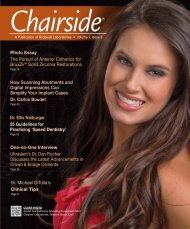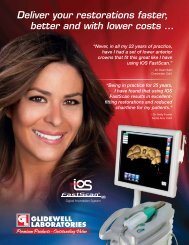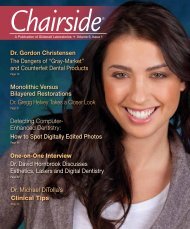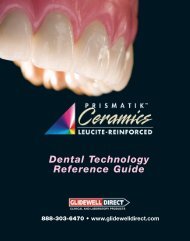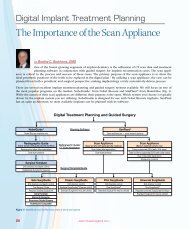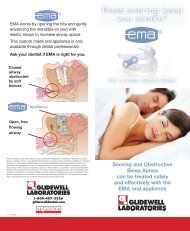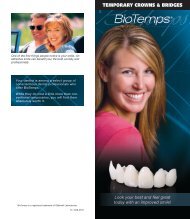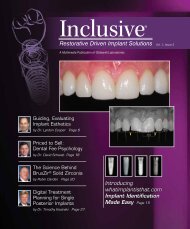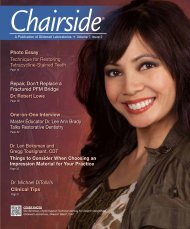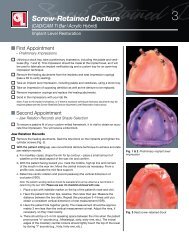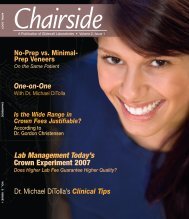PDF Version - Glidewell Dental Labs
PDF Version - Glidewell Dental Labs
PDF Version - Glidewell Dental Labs
Create successful ePaper yourself
Turn your PDF publications into a flip-book with our unique Google optimized e-Paper software.
Implants Are Easy to Code: The Question Is the Final Appliance!<br />
Tom M. Limoli, Jr.<br />
Gaining in rapid popularity are these so-called “mini<br />
implants.” They are sometimes referred to as “small” or<br />
“narrow diameter” depending on the precise dimensions as<br />
well as the specific manufacturer. From the coding, billing<br />
and reimbursement perspective, let’s separate the global<br />
procedure into its two major subcomponents. They are the<br />
implant and the existing denture that is now being modified<br />
to become an overdenture.<br />
Procedure code D6010 identifies the surgical placement<br />
of the implant body. In reviewing thousands of claims for<br />
multiple implant placements during the same surgical<br />
series, it is not uncommon to find documentation and<br />
billing based upon the premise of the “single incision<br />
rule.” This type of billing generally results in the first<br />
implant being billed at 100 percent of the fee, while each<br />
additional at the same surgical visit being billed at some<br />
variation of 80 percent, 60 percent, all the way down to<br />
40 percent of the fee for the first surgically placed implant.<br />
Implant Codes and Fees<br />
When the technique involved is the modification of an<br />
existing removable denture to one becoming an implantretained<br />
overdenture, they are globally identified with<br />
procedure code D5875. This code would only be applicable<br />
if we were simply going to be using the patient’s existing<br />
appliance with modifications. A weakness in the existing<br />
coding sequence is that code D5875 does not specify if<br />
the original removable appliance replaces either a partial<br />
or completely edentulous arch. Also the fact that this code,<br />
by ADA definition, does not require a “by report” clinical<br />
narrative makes the claim delay the inevitable. That is why<br />
I recommend that the code always be submitted with a<br />
description of the prosthetic modification along with the<br />
original date of placement and anticipated longevity.<br />
As concerns Dr. Nazarian’s specific technique and<br />
treatment plan for this individual patient code, D5875 would<br />
not apply since the completed “global” procedure is in fact<br />
an implant-retained overdenture identified by code D6053.<br />
Code Description Low Medium High<br />
National<br />
Average<br />
National<br />
RV<br />
D5875<br />
Modification of removable<br />
prosthesis following implant surgery<br />
$250 $324 $577 $334 6.68<br />
D6010 Surgical placement of implant body $1,532 $1,745 $2,398 $2,012 40.24<br />
D6053<br />
Implant/abutment-supported<br />
removable denture<br />
$2,117 $2,514 $3,500 $2,650 53.00<br />
CDT-2011/2012 copyright American <strong>Dental</strong> Association. All rights reserved. Fee data copyright Limoli and Associates/Atlanta <strong>Dental</strong> Consultants. This data<br />
represents 100 percent of the 90 th percentile. The relative value is based upon the national average and not the individual columns of broad-based data.<br />
The abbreviated code numbers and descriptors are not intended to be a comprehensive listing. Customized fee schedule analysis for your individual office<br />
is available for a charge from Limoli and Associates/Atlanta <strong>Dental</strong> Consultants at 800-344-2633 or www.limoli.com.<br />
Closing Comments<br />
The advent of the mini dental implant has given general<br />
dentists an efficient and more affordable way of solving<br />
many of the challenges associated with complete dentures.<br />
In providing mini dental implants that immediately improve<br />
denture function and retention, the clinician can rapidly<br />
restore a patient’s confidence and also yield positive economic<br />
benefits for the practice. In addition, the simplified protocols,<br />
conservative procedures and elimination of gingival surgery<br />
make mini dental implants ideal for medically, anatomically<br />
and financially compromised patients.<br />
It has been estimated that more than 36 million patients in<br />
the United States have lost their teeth; however, 0.5 percent<br />
have received implant therapy. This striking disparity signifies<br />
a huge untapped market for implants and dentures! CM<br />
Dr. Nazarian maintains a private practice in Troy, Mich., with an emphasis on<br />
comprehensive and restorative care. He can be reached at 248-457-0500 or at<br />
www.aranazariandds.com.<br />
Disclosure: Dr. Nazarian reports no disclosures.<br />
Reprinted by permission of Dentistry Today, © 2012 Dentistry Today.<br />
18 www.chairsidemagazine.com



